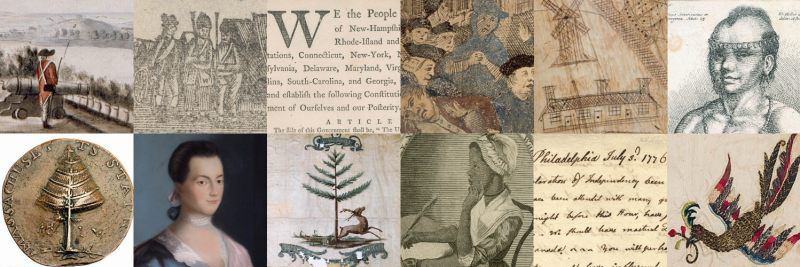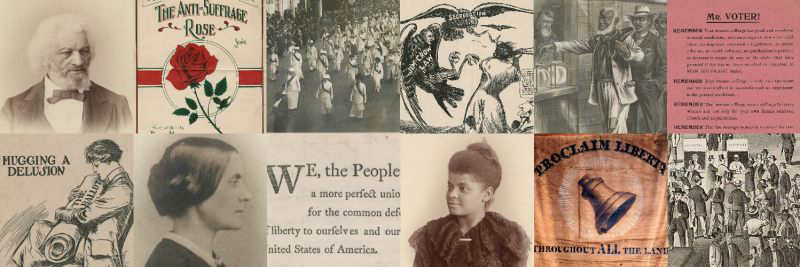Conferences
2022 Conference : Underrepresented Voices of the American Revolution
Save the date: July 14-16
In recent decades, scholars have unearthed and revived stories of a diverse and wide-ranging cast of characters who lived through America’s political formation. This much-needed corrective has unraveled a traditional narrative of wealthy white male revolutionaries rebelling against a white male dominated imperial government. The lead up to the 250th anniversary of the Declaration of Independence offers an opportunity to highlight and share the latest scholarship on the topic of underrepresented voices of the American Revolution whether that be from the perspective of Native Americans, women, African Americans, loyalists, ethnic and religious minorities, children, or neutrals in a global war that put the question of representation at its core. This conference will bring together scholars to explore the broad themes associated with historic individuals or groups not traditionally considered in discussing the American Revolutionary Era.
As an organization that operates within academia and the public history arena, the Massachusetts Historical Society both champions important scholarship and supports vital public history initiatives like professional development for K-12 instruction. This conference will serve both constituencies—scholars and K-12 educators—by providing a platform to consider how the classroom serves as a key site of historical representation. Teachers will be invited to attend the traditional academic sessions, and scholars in turn will be invited to participate in a concluding teacher workshop at the end of the conference. We encourage participation from scholars who are eager to engage with and learn from K-12 educators, as well as teachers who are looking to incorporate the latest scholarship into the classroom.
The conference and workshop will take place at Suffolk University and the Massachusetts Historical Society in Boston on 14-16 July 2022. The panels and presentations will take place on 14-15 July with the teacher workshop on 16 July. See the lineup of academic panels below.
Panels:
Keynote Panel:
- Colin Calloway, Dartmouth College
- Kathleen DuVal, University of North Carolina at Chapel Hill
- Chernoh Sesay, DePaul University
[1] Indian Sovereignty and the Revolution
- Christian Crouch, Bard College, “An American (Indian) in Paris: Methods for Rethinking Euro-American Histories of Revolution”
- Lori Daggar, Ursinus College, “Diplomacy and Indigenous Sovereignty in the Age of Revolutions”
- Blake Grindon, Princeton, University “Kahnawake-French Diplomacy and the Multiple Meanings of the American Revolutionary War in the Northeast”
- Bryan Rindfleisch, Marquette University, “‘Where your Warriors have Left their Bones, There our Bones are Seen Also’: The Stockbridge-Mohican Indian Community in the Revolutionary War, 1775-1783”
Comment: Daniel Mandell, Truman State University
[2] Underrepresented Voices in the Archives
- Sabrina Bocanegra, Bayard Miller, and Kyle Roberts, American Philosophical Society, “Revolutionary City: Recovering Underrepresented Voices in the Archives”
- Marcus Nevius, University of Rhode Island, “Who Stands in the Digital Shadows?: Slavery in a Little Known Corner of the Old Dominion in the Age of the American Revolution”
Comment: Kathryn Tomasek, Wheaton College (MA)
[3] Loyalist Women, part 1
- Alexi Garrett, Iona College, “Rhetorical Strategies and Enslaved People in the Loyalist Claims of Southern Feme Soles”
- Patrick O’Brien, Kennesaw State University, “‘There Will Be No Difficulty About Him’: The Enslaved and the Preservation of Kinship Networks in the Black Loyalist Diaspora”
- MaryKate Smolenski, Preservation Society of Newport County, “Representation, Consumption, and Status: A Portrait of Loyalist Deborah Malbone Hunter”
Comment: Harvey Amani Whitfield, University of Vermont
[4] Loyalist women, part 2
- Adam McNeil, Rutgers University, “Black Women, Freedom Politics, and the American Revolution”
- Stephanie Seal Walters, University of Southern Mississippi, “Mother, Wife, Loyalist: The Experiences of Virginia's Loyalist Women in the Revolutionary Era”
- Martha King, Papers of Thomas Jefferson, “Mary Katherine Goddard and the Limits of Loyalty”
Comment: Harvey Amani Whitfield, University of Vermont
[5] The Non-Human Revolution
- David Hsiung, Juniata College, “Animals and Military Metabolisms at the Start of the War of Independence: Moo-ving Towards an Environmental History of the American Revolution”
- Andrea Ringer, Tennessee State University, “‘They have heard the roaring of many a cannon’: Horses and Other Nonhuman Animals in the American Revolution”
- Charlotte Carrington-Farmer, Roger Williams University, “Equine Atlantic: The Animal Turn in the Context of the American Revolution”
Comment: Harriet Ritvo, MIT
[6] Imperial Borderlands
- Kristin Lee, Washington University in St. Louis, “In Support of the Patriot Cause: Enslaved Lives and the Willing Raids”
- Darcy Stevens, University of Maine, “Performing Allegiance and Neutrality in Occupied Machias and Bagaduce Maine During the American”
- Jaqueline Reynoso, California State University, Channel Islands, “‘[T]hey were now become subjects of England’: Allegiance, Protest, and Subjecthood in Late Eighteenth-Century Quebec”
Comment: Benjamin Carp, Brooklyn College
[7] Southern Revolutionary Worlds
- James McKay, University of Edinburgh, “‘Run away a long time’: Enslaved and Self-Emancipated People's Movements in the Southern Low Country, 1778-1782”
- Andrea Miles, University of Louisville, “Black Rebels: African American Patriots from North Carolina”
- Susannah Huary, University of North Carolina, Chapel Hill, “Instigating Insurrections: Black Boatmen on the Eve of Revolution”
Comment: Matthew Mason, Brigham Young University
[8] Reconsidering Revolutionary New England
- Nicole Breault, University of Connecticut, “Witness to Crisis and Revolution: The Reports of Boston's Town Watch, 1763-1775”
- Benjamin Remillard, University of New Hampshire, “The Life-Long Activism of the Revolution’s Soldiers of Color”
- Kate Viens, Charles River Museum of Industry and Innovation, “Beyond Bounds: Confronting Loyalists and Defining Patriotism in Rural Massachusetts”
Comment: Rebecca Brannon, James Madison University
[9] Claiming Exodus: Jews, Black Protestants, and Revolutionary Religious Freedom
- Kristina Benham, Baylor University, "‘A Most Dangerous Procrastination’: The Old Testament, the American Revolution, and African American Religion”
- Michael Hoberman, Fitchburg State University, “‘May the Lord fight for them’: Gershom Seixas and the Rhetoric of the American Revolution”
- Adam Jortner, Auburn University, “A Possibility of Jews: The Revolution, American Jewry, and Religious Freedom”
Comment: Katherine Carté, Southern Methodist University
Virtual 2020 Conrad E. Wright Research Conference
“Shall Not Be Denied”: The 15th and 19th Amendments at the Sesquicentennial and Centennial of their Ratifications, October 12-16, 2020
View Conference Program below or download a pdf:
As a result of ongoing public health concerns, the Massachusetts Historical Society has altered its original plan for an in-person conference in October 2020. Rather than meeting for two days of sessions, we will host the conference panels online between Monday, 12 October and Friday, 16 October 2020. The originally scheduled keynote panel will be postponed until it is safe to hold the event in person at the MHS.
The year 2020 marks the anniversaries of two critical amendments to the United States Constitution. Spaced fifty years apart, the Fifteenth and Nineteenth Amendments, ratified in 1870 and 1920, respectively, prohibited the use of race or sex to deny American citizens the franchise. However, the amendments did not prevent states from adopting other methods of discrimination. Viewed as the product of two different movements—abolitionism and the Civil War on the one hand and the Progressive campaigns and the First World War on the other—these two periods and amendments are not often considered together. This conference revisits the long journey to secure voting rights for African Americans and women in United States history. It considers the legal precedents and hurdles that each amendment faced, the meaning and uneven outcomes of each, the social context that allowed for ultimate ratification, the role of key individuals and groups in these respective contexts, and how each amendment has been remembered over time.
At a later date, a keynote panel will feature feature Profs. Alison M. Parker (University of Delaware) and Lisa Tetrault (Carnegie Mellon University) and will be moderated by Prof. Alex Keyssar (Harvard).
Conference Publications
Since its first conference volume on American Unitarianism, issued in 1989, the MHS has made the scholarship developed through its conferences widely and permanently available to the field.
The MHS publication series Studies in American History and Culture comprises many of these volumes. More recently, MHS conference volumes published by other presses have given our conference scholarship an even wider reach. Peruse these essay collections.
Past Conferences
See a list of past conferences here.




